I realize that my admiration for the action sequences in Ang Lee‘s high-frame-rate 4K Gemini Man means that I’m part of an extremely small minority, but my eyes really love the HFR…the startling clarity and 100% absence of any sort of motion blur. Yes, it doesn’t look or feel like “film” or movies, but I love it anyway when it comes to high velocity. I wasn’t a huge fan of the film itself, but who was?
Month: October 2020
I Can Hear Colors
Venice side street, taken in late May of 2017. Please consider the ancient wall and the soft and subdued yellow paint, and especially the mint-green colored awning accented by those six or seven strips of pink neon. If shot on 35mm film the only person who could properly capture this late-evening milieu would be Vittorio Storaro. I haven’t been to Venice since. It almost hurts to think about it. They say the camera on the new iPhone 12 is the best yet, and that it captures amazing colors and details when there’s not much light.
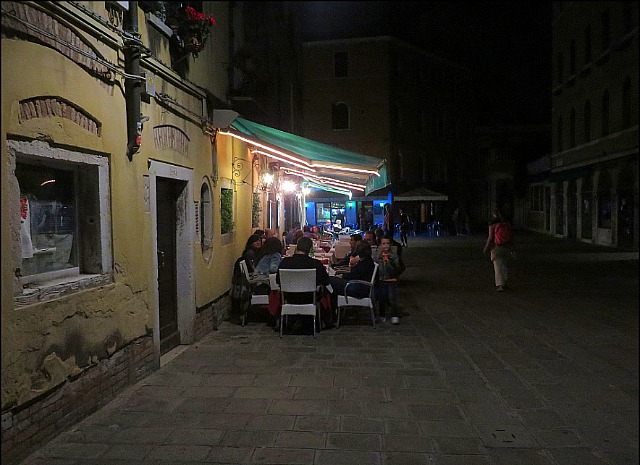
Take The Hustler Out Of Queens…
Excerpt from Barry Levine‘s “The Spider: Inside the Criminal Web of Jeffrey Epstein and Ghislaine Maxwell“:
“William ‘Dollar Bill’ Mersey spent hours with Epstein inside New York’s notorious Metropolitan Correctional Center in his role as an ‘inmate companion’ while the multimillionaire was on suicide watch. Mersey served a year at MCC in lower Manhattan after pleading guilty to federal tax evasion for under-reporting income from his escort advertising agency. He was released in early November last year.
Mersey quote: “Epstein didn’t brag about his lifestyle but knew everybody [who] mattered, so I did ask him one time, ‘Jeffrey, give me one anecdote that’s emblematic of the essence of Donald Trump.’
“Epstein thought about it and then said, ‘Donald and I are flying in my private jet to Florida and I have a French girl with me. Donald says to me, why don’t we land in Atlantic City so I can show your friend my casino?
“[Epstein] said, I’m not landing in Atlantic City…it’s all white trash down there. So the French girl goes, what does white trash mean? I don’t understand. And Trump says, ‘It’s me without money.'”
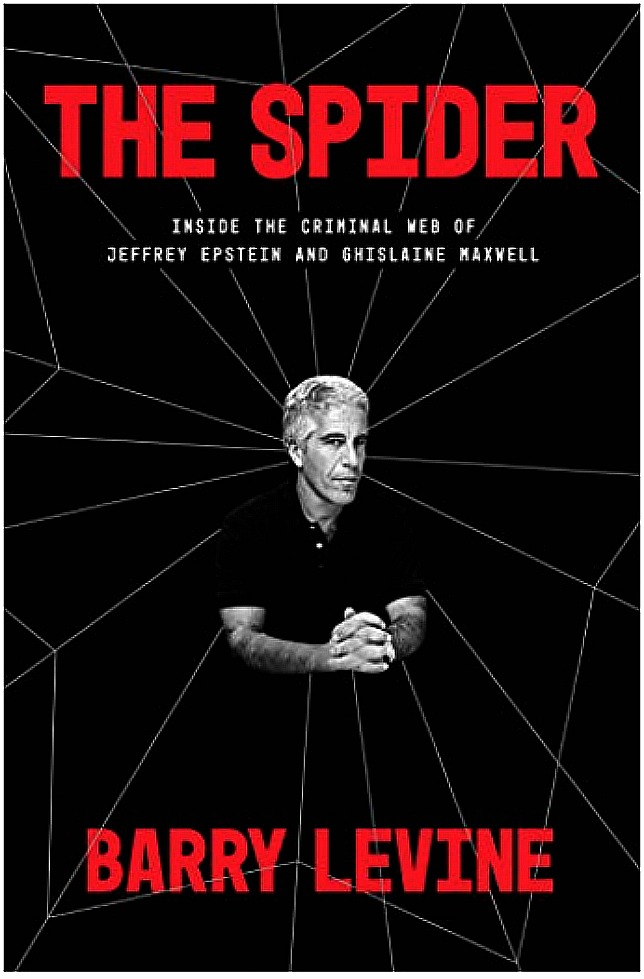
Cary Grant, Part 3
“I distinctly remember feeling tear-struck in 1986 when I learned of the death of Cary Grant, whom I’d always regarded as a beloved debonair uncle of sorts. I didn’t feel anything close to that when I heard the same news about my dad. The truth is the truth.” — from “Nobody’s Perfect,” an obit for my father, James Wells, who died on 6.19.08.
Grant, John Lennon, Marlon Brando and JFK — these are the only famous guys in my entire lifetime whose passing brought tears to my eyes.
In Los Angeles the news hit sometime around 10 pm on the evening of Saturday, 11.29.86. I was living in my Hightower Drive bungalow. I recall stepping outside and sitting down on my little front porch and meditating on finality as a general concept. The weepy moment came the following day. In a sense Grant had been a close companion almost my entire time on the planet, or at least from my teenage days onward, when I began watching some of his old films on the tube.
It was only a week or two later when I went down to Al’s Bar with a friend, and it was there that I ran into my future wife Maggie, who was hanging out with two girlfriends. We flew to Paris the following January, during a fairly brutal cold snap. We moved into the upstairs portion of 8682 Franklin Ave. the following August or thereabouts, and got married in Paris the following October.
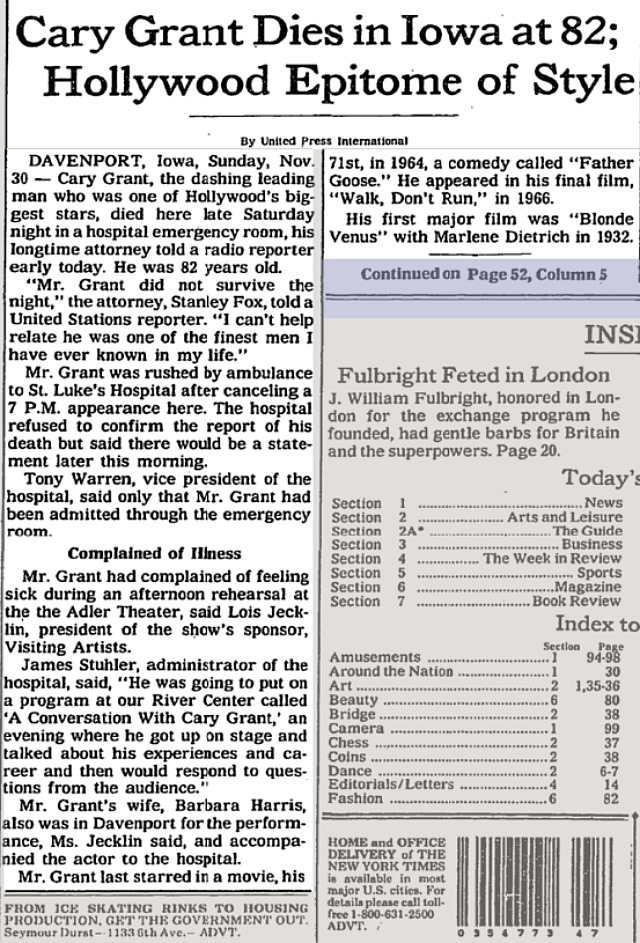
Vengeance Is Sweet
Speaking as a longtime advocate of Green Reeducation Camps, I understand the talk about establishing some kind of post-Trump Truth and Reconciliation Commission.
I love the idea of Donald Trump, Bill Barr, Mitch McConnell, Tucker Carlson, Steve Bannon, Donald Trump, Jr. and other enabling scoundrels having to explain and defend their actions in a Nuremberg-like setting. The idea of some of these guys (Trump and Barr for sure) going to prison is delightful. They deserve to do time, preferably on chain gangs. You know they do.
More than 40 countries have established truth commissions, including Canada, Chile, Ecuador, Ghana, Guatemala, Kenya, Liberia, Morocco, Philippines, Rwanda, Sierra Leone, South Africa and South Korea.
Then again I’m not sure if wokester terror will become weaker or stronger in the wake of a Biden victory. Maybe it’ll calm down. I don’t know what’s in the cards. I do know that as much as I loathe and despise the Trumpanzees, the left community (which used to represent the honest, truth-telling good guys) has become equally terrifying. Wokester Orwellian oppression is real.
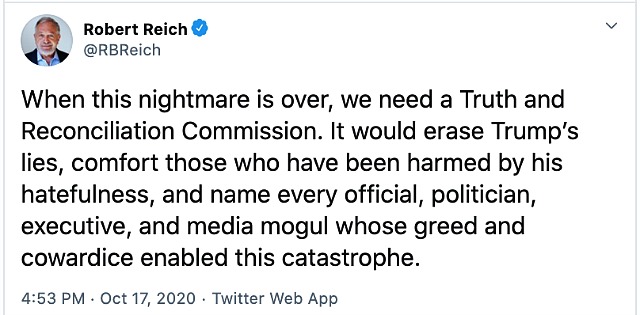
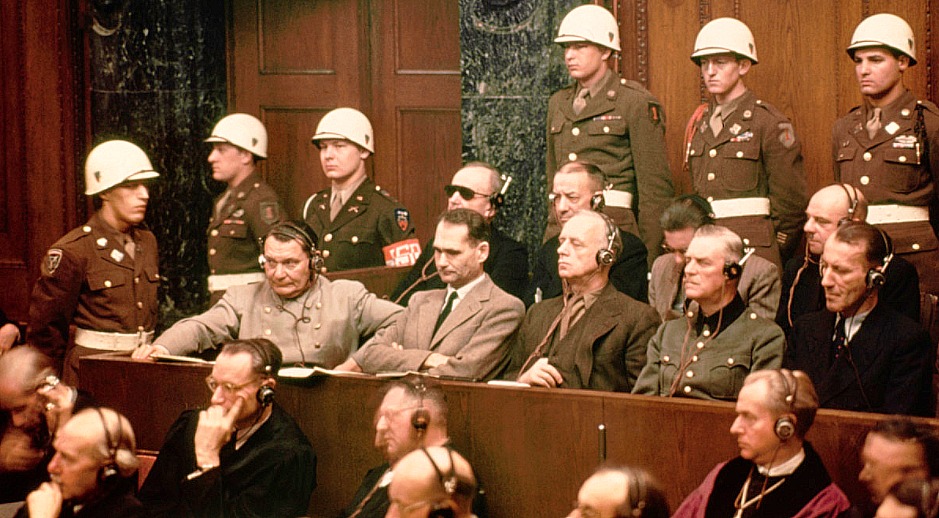
Another Scott Mantz Instructional
HE to Scott Mantz: I’ve pointed this out on several occasions, but at the time of its release Phil Kaufman‘s Invasion of the Body Snatchers (’78) had nothing to do with anything. It was just a well-made Bay Area spooker (man’s head on dog’s body!)…just a remake that Kaufman decided to do, knowing full well that the social metaphor that had fortified and deepened the 1956 Don Siegel original had evaporated. Kaufman’s version is not amazing. It’s just okay or, you know, good in a spotty kind of way.
Where was the late ‘70s metaphor for creeping conformity (i.e., large seed pods taking over bodies)? It was obvious 22 years earlier with suburban multitudes falling into line with bland Eisenhower-era vales and lifestyles, but not so much in the era of cocaine, Studio 54 and Jimmy Carter.
Oh, and ghoulish Donald Sutherland howling and pointing is not an echo of the pandemic, Scott — most of us see him as a representative of wokesters accusing those who’ve failed to uphold woke standards -— those who’ve used the wrong term, tweeted something clumsy or inappropriate 5 or 10 years ago, failed to submit to anti-racist training, answered a question in the wrong way or muttered in passing that “all lives matter.”
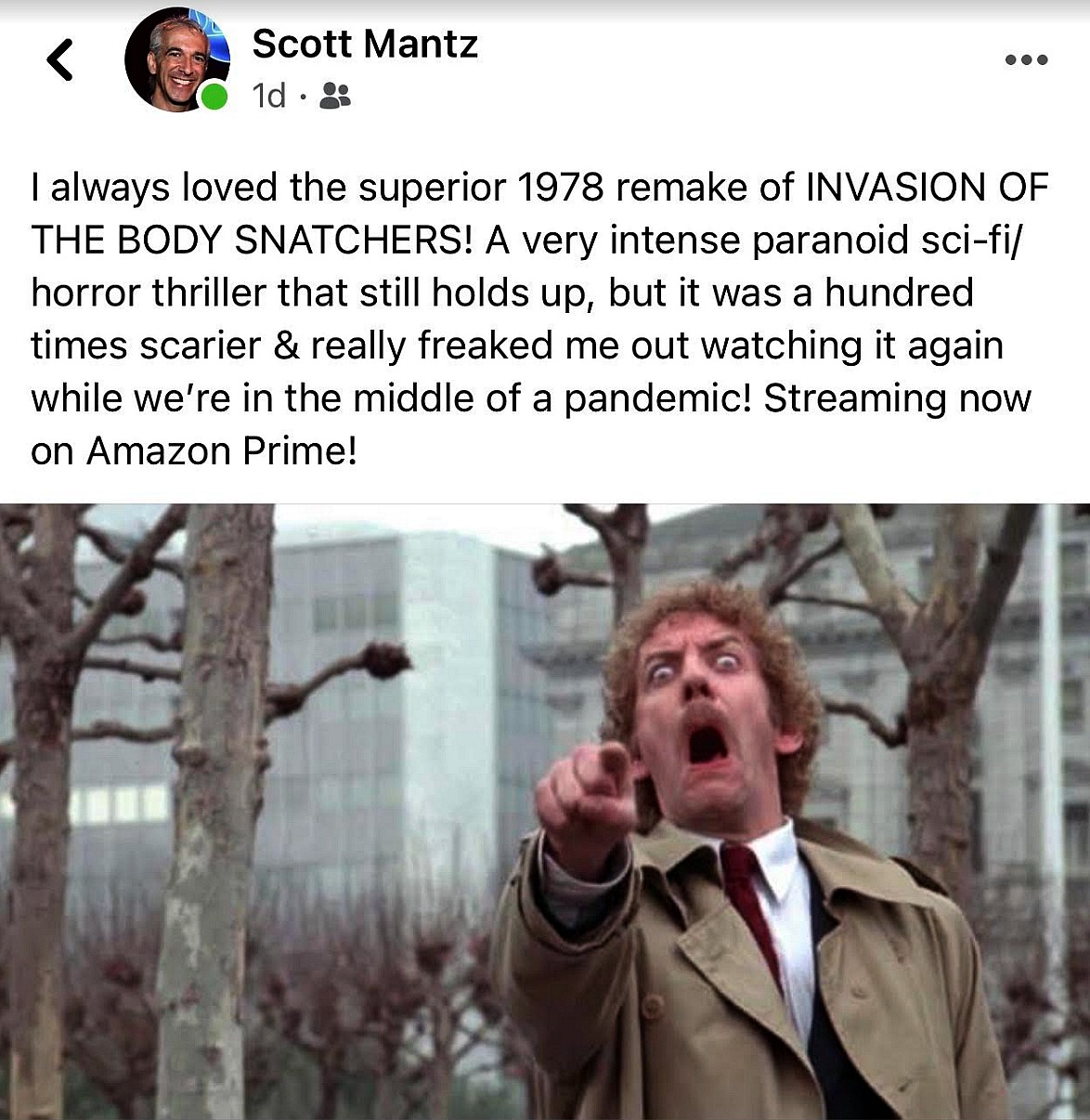
Mantz doesn’t want to acknowledge that wokesters are the same people who burned Oliver Reed at the stake in The Devils. He’s understandably scared of even alluding to this. But Bret Stephens gets it.
“Our compromised liberalism has left a generation of writers weighing their every word for fear that a wrong one could wreck their professional lives. The result is safer, but also more timid; more correct, but also less interesting. It is simultaneously bad for those who write, and boring for those who read. It is as deadly an enemy of writing as has ever been devised.
“The more some ideas become undiscussable, the more some things become unsayable, the more difficult it becomes to write well. We are killing democracy one weak verb, blurred analogy and deleted sentence at a time.
“I should be more precise. When I say ‘we’ I don’t mean normal people who haven’t been trained in the art of never saying what they really think. I mean those of us who are supposed to be the gatekeepers of what was once a robust and confident liberal culture that believed in the value of clear expression and bold argument. This is a culture that has been losing its nerve for 30 years. As we go, so does the rest of democracy.”
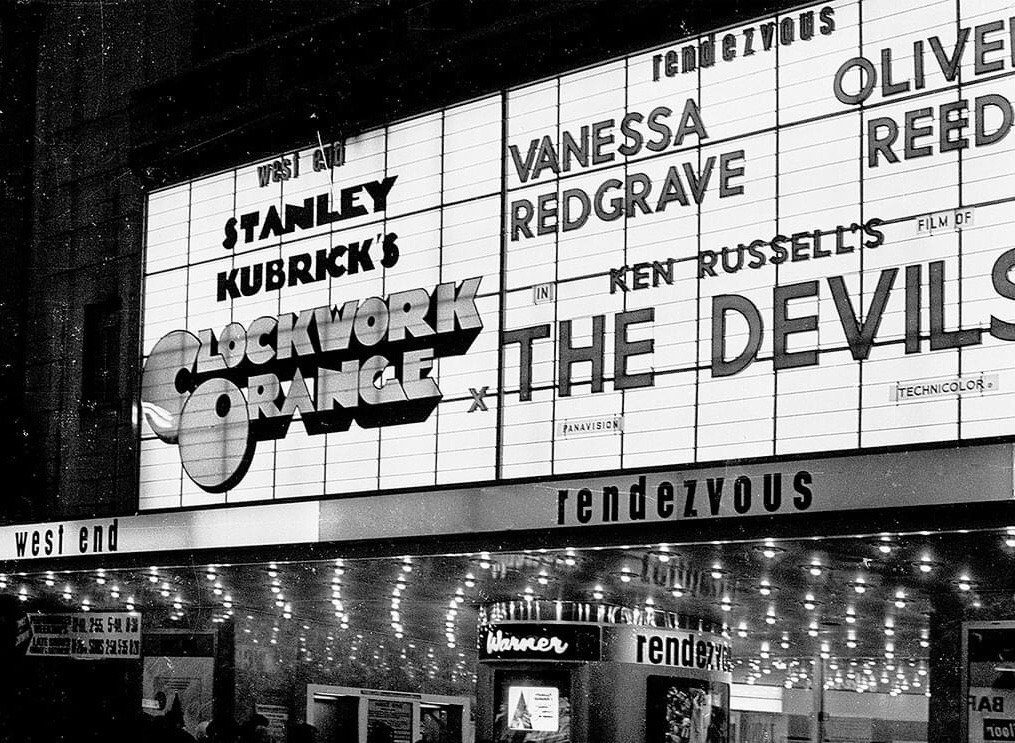
Too Young To Be President
But with some experience and seasoning…
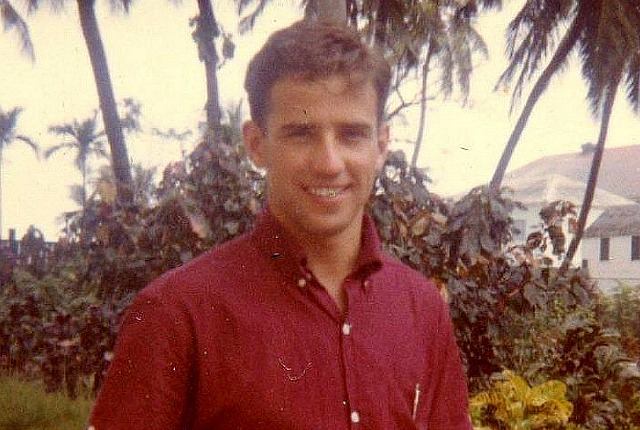

The Dude Will Probably Get Through This
…and perhaps may even be cured.
The treatment for Hodgkin lymphoma is highly effective. The five-year survival rate for dudes with Hodgkin lymphoma is 87%. If the cancer is found in its earliest stages, the five-year survival rate is 92%. If the cancer spreads regionally, the five-year survival rate is 94%. If the cancer has spread to different parts of the body, the five-year survival rate is 78%.
Non-Hodgkin lymphoma may arise in lymph nodes anywhere in the body. Hodgkin lymphoma typically begins in the upper body, such as the neck, chest or armpits. Hodgkin lymphoma is often diagnosed at an early stage and is therefore considered one of the most treatable cancers.
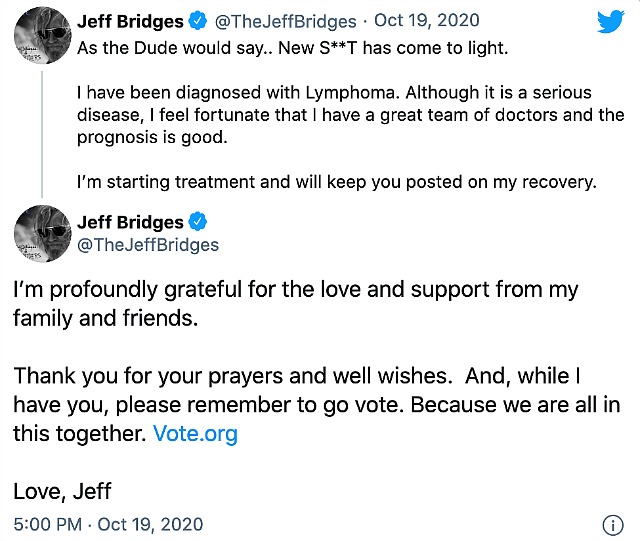
Shawn Colvin resides in Austin, Texas…
…with her pet cats. Which I’m happy to hear.
Top Dues
Delroy Lindo, Bill Murray, Glenn Close and Michelle Pfeiffer are all overdue for Oscar recognition. This year they’ve all hit the jackpot in Da 5 Bloods, On The Rocks, Hillbilly Elegy and French Exit, respectively. I’d rather not say who’s the most deserving in this regard. Okay, it’s Close — she’s been nominated six or seven times over the last 40 years. Lindo’s performance as a Trump-supporting Vietnam veteran is fairly locked in. Murray’s performance represents 85% to 90% of On The Rock‘s allure, but I’m not sure it’s on the level of his historic turns in Rushmore and Mad Dog and Glory. Pfeiffer’s 40 years in the business could in themselves validate her “due”-ness. Close, Murray, Lindo and Pfeiffer — that’s my lineup.
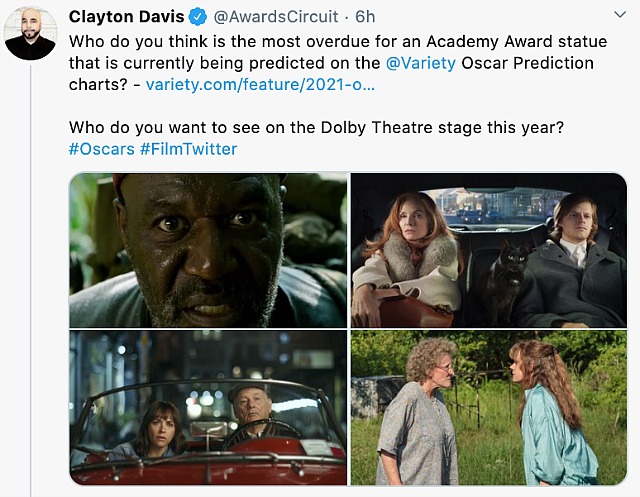
Saved By Hitchcock
From Pauline Kael’s “The Man From Dream City,” published in The New Yorker on 7.7.75. “Nearly all of Cary Grant’s seventy-two films have a certain amount of class and are well above the Hollywood average, but most of them, when you come right down to it, are not really very good.
“Grant could glide through a picture in a way that leaves one indifferent, as in the role of a quaint guardian angel named Dudley in the bland, musty Goldwyn production The Bishop’s Wife (1947), and he could be the standard put-upon male of burbling comedy, as in Every Girl Should Be Married (1948) and the pitifully punk Room for One More (1952) — the nice-nice pictures he made with Betsy Drake, who in 1949 became his third wife.
“[And] he could be fairly persuasive in astute, reflective parts, as in the Richard Brooks thriller Crisis (1950), in which he plays a brain surgeon forced to operate on a Latin-American dictator (José Ferrer). He’s a seasoned performer here, though his energy level isn’t as high as in the true Grant roles and he’s a little cold, staring absently when he means to indicate serious thought. What’s missing is probably that his own sense of humor isn’t allowed to come through; generally when he isn’t playing a man who laughs easily he isn’t all there.
“No doubt Grant was big enough at the box-office to have kept going indefinitely, surviving fables about caterpillars, and even such mournful mistakes as hauling a cannon through the Napoleonic period of The Pride and the Passion.
“But if Alfred Hitchcock, who had worked with him earlier on Suspicion, hadn’t rescued him with Notorious, in 1946, and again, in 1955, with To Catch a Thief (a flimsy script but with a show-off role for him) and in 1959 with North by Northwest, and if Grant hadn’t appeared in the Stanley Donen film Charade in 1963, his development as an actor would have essentially been over in 1940, when he was only thirty-six.
“In all four of those romantic suspense comedies, Grant played the glamorous, worldly figure that ‘Cary Grant’ had come to mean: he was cast as Cary Grant, and he gave a performance as Cary Grant. It was his one creation, and it had become the only role for him to play — the only role, finally, he could play.
“The special charm of Notorious, of the piffle To Catch a Thief, and of North by Northwest and Charade is that they give him his due. He is, after all, an immortal — an ideal of sophistication forever. He spins high in the sky, like Fred Astaire and Ginger Rogers. He may not be able to do much, but what he can do no one else has ever done so well, and because of his civilized non-aggressiveness and his witty acceptance of his own foolishness we see ourselves idealized in him. He’s self-aware in a charming, non-egotistic way that appeals to the very people we’d want to appeal to.”
“Mother of the Blues”, Screwed on Revenues
Am I allowed to say that one of the first things I noticed about Viola Davis‘s Ma Rainey is her liberal application of rouge? And that she could do with a bit less?
Boilerplate: “Tensions and temperatures rise over the course of an afternoon recording session in 1920s Chicago as a band of musicians await the trailblazing Ma Rainey — legendary ‘Mother of the Blues.’ Late to the session, the fearless, fiery Ma engages in a battle of wills with her white manager and producer over control of her music. As the band waits in the studio’s claustrophobic rehearsal room, ambitious trumpeter Levee (Chadwick Boseman) — who has an eye for Ma’s girlfriend and is determined to stake his own claim on the music industry — spurs his fellow musicians into an eruption of stories, truths, and lies that will forever change the course of their lives.”
Gertrude “Ma” Rainey (born Gertrude Pridgett, 4.26.86 – 12.22.39) “was one of the earliest African-American professional blues singers and one of the first generation of blues singers to record. Known for her powerful vocals, energetic disposition, majestic phrasing and a moaning style of singing — qualities most evident in her early recordings ‘Bo-Weevil Blues’ and ‘Moonshine Blues’.”
“Rainey recorded with Thomas Dorsey and Louis Armstrong, and she toured and recorded with the Georgia Jazz Band. She toured until 1935, when she largely retired from performing and continued as a theater impresario in her hometown of Columbus, Georgia until her death at age 53.”

